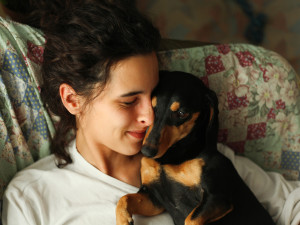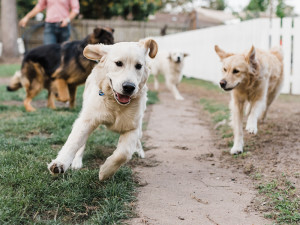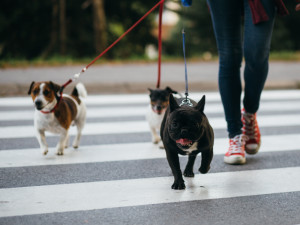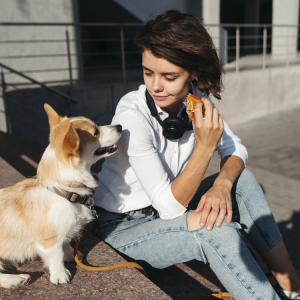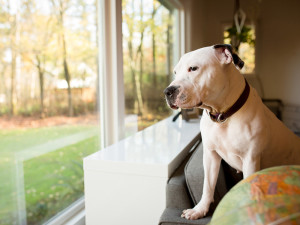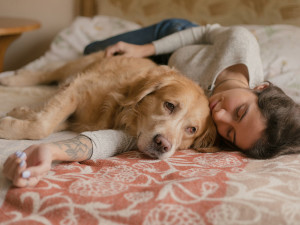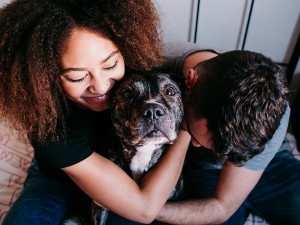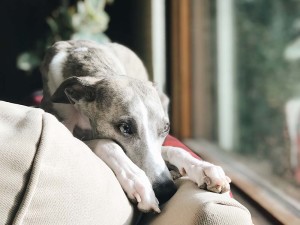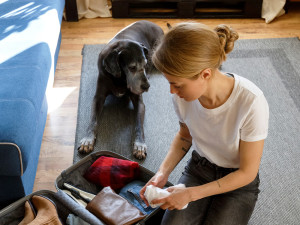Pet Parents Get Separation Anxiety, Too
We asked both animal behaviorists and human psychologists how you can deal with leaving your dog home alone.
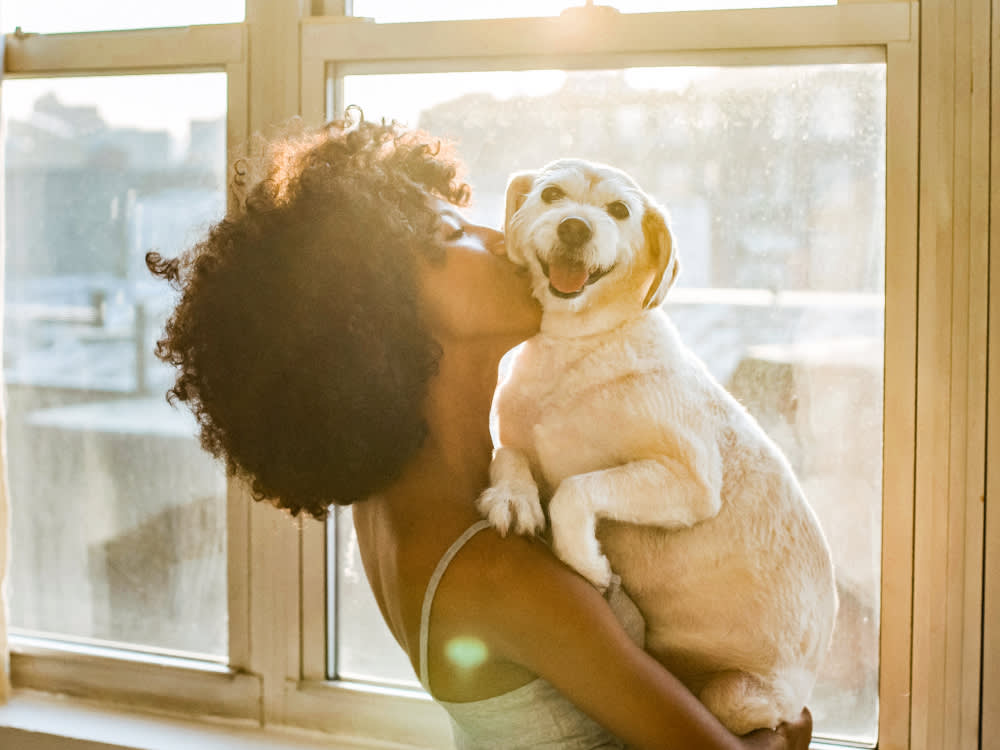
Share Article
Patricia McConnell, PhD, had me at “separation anxiety.” But not in the way you’d expect. “I do indeed suffer from separation anxiety when I leave my dogs,” the renowned animal behaviorist and authoropens in new tab says. “I don’t know about you, but I’m already starting to stress lick.”
My reaction? I’m not alone! It turns out that separation anxiety in pet parents — which ranges from a reluctance to leave your dog for even a few minutes to a complete inability to travel — is a lot more common than I realized. In fact, nearly half of the pet parent population can relate; a CertaPet studyopens in new tab found that 47% of dog parents experience separation anxiety when away from their pets.
If you’re anything like me, you’ve probably figured out how to deal with your dog’s separation anxiety — but what about your own? Here are some pointers from McConnell and other behavior specialists.
What Separation Anxiety Looks Like in Pet Parents
“It’s so individual,” says Faith Maloney, co-founder of Best Friends Animal Societyopens in new tab, who, along with psychologist Linda Harper, PhD, has helped many pet parents deal with their anxiety. “Every single situation that I’ve come across is unique to that person or that family.”

One scenario does pop up a lot, though, she adds. Something bad happens while the pet parent is away — the dog gets sick at a boarding kennel, for example, or the dog sitter forgets to show up. “Then, based on some of these traumatic experiences, people say, ‘I can never leave again.’”
For others, the mere fact that their dog had a rough past before they adopted them can keep them tethered to their pup. “I’ve got rescues,” says Sarah Bartley, who is mom to a 14-year-old Pit Bull/Greyhound mix, an 8-year-old Shepherd/Border Collie mix, and two previously neglected horses. “I gave my dogs my word when I took them on that they would have the best life possible,” she says. “They’ve come to love me, so I don’t want to go out without them.”
I made a similar promise to my Beagle, Emma, who was a caged breeder before she came to live with us. She crawled into my lap the moment I met her at the North Shore Animal Leagueopens in new tab in New York, and my lap remains Emma’s safe place when she’s scared or insecure. I love that Emma wants to press into me every chance she gets, and comes straight to me when she needs support. But when I comfort her, am I making it harder for her to stand on her own two — er, four — feet?
How to Deal With Your Separation Anxiety
“You can’t change what happened to your dog,” McConnell says. “But you can do everything possible to help your dog be a healthy, happy, stable individual. Dogs who have been really damaged tend to be brittle. But we work toward creating individuals who are more flexible, who can bend rather than crack,” she says.
Understanding that the best thing I can do for Emma is to help her develop the confidence and comfort level to be alone helped me deal with my own separation anxiety. “When you think about what you’re really doing, to be effective as a pet owner, giving dogs the skills to be independent is one of the best gifts,” says Pamela Uncles, MEd, CDBC, a Virginia-based animal behavior consultant.
Do Prepare Your Dog (and Yourself) for Time Apart
It’s helpful for pet parents to understand that as soon as they bring a dog into their home, they need to start preparing the pup (and themselves) for time apart. Of course, even if the dogs can handle our departures, that doesn’t guarantee it will be easy for us to say good-bye.
McConnell doesn’t travel as much as she used to, she says, and missing her dogs is a factor in that decision. “I know when I come home from being gone, the way they greet me, they’re clearly over-the-moon happy to see me, but I don’t have dogs with separation anxiety,” she says. “They’re fine. I think it’s more about me.”
Don’t Project Your Emotions onto Your Dog
Some psychologists, such as Chicago-based Linda Harper, PhD, who specializes in helping people deal with the highs and lows of caring for animals, say it’s normal to experience strong emotions for their pups. “It is in the animal advocate’s nature to experience intense feelings for animals,” Harper writes in her book, The Power of Joy in Giving to Animalsopens in new tab. “We feel what we think they feel. They’re not ‘just an animal.’ We read pain in their eyes, we interpret their whines and barks and meows. We feel their excitement and we imagine their disappointment.”
Bartley not only felt such intense emotions, she also recognized that she was giving all that she had to her animals and not taking enough for herself. In eight years, she had only traveled once; she even reduced her hours working to part-time so she didn’t have to leave her dogs alone so long. Okay, you’re getting kind of crazy, Bartley recalls saying to herself last year. You have to let go a little bit. So she made arrangements for someone to care for her animals and attended a retreat designed to help pet parents deal with their separation anxiety — a great idea, according to McConnell.
“A good first step is to travel to a dog behavior or training seminar,” she says. Concerned owners can justify leaving their pup at home because they’re going to learn something that will benefit them. After returning home to a happy and healthy dog (assuming all goes well), they just might feel confident enough to try traveling again.
But for some — even when they know that their dogs can handle their absences and will receive great care while they’re gone — going on vacation can be bittersweet. What does McConnell do during the really rough times? She turns to good ol’ classical conditioning: “I literally eat chocolate,” she admits. “Never, ever dismiss the power of chocolate.”

Tracy Krulik, CTC, CSAT
Tracy Krulik, CTC, CSAT, is a Northern Virginia-based certified canine separation anxiety trainer and honors graduate of Jean Donaldson’s prestigious Academy for Dog Trainersopens in new tab. Krulik is also the founder and managing editor of iSpeakDogopens in new tab — a website and public awareness campaign to teach dog body language and behavior.
Related articles
![Muscular white pit bull stands on couch, looking out window to sunny fall day.]()
Separation Anxiety in Dogs
Does your dog freak out when you head for the door? Here’s some advice.
Does Your Dog Need Anti-Anxiety Meds?
How to cope with dog anxiety—from training to medication.
![Young woman looking at cellphone with her dog]()
Does Your Dog Understand When You FaceTime Them?
It’s a nice thought.
![Dog sitting in a newly unpacked living room with moving boxes around]()
Making a Move? Here’s How to Help Your Dog Adjust to Your New Digs
Your dog loathes moving, too. These tips will make it easier on everyone.
![Couple hugs their merle Boxer]()
How to Improve Your Relationship with Your Dog
Animal behaviorist Dr. Karen B. London on how to strengthen your pet-parent bond.
![Greyhound dog lying on top of couch looking out of a window]()
8 Calming Products That Help My Dog’s Anxiety
Compression vests, interactive toys, and pheromone sprays will be game-changers this Fourth of July.
![A woman packing her suitcase with a dog laying nearby.]()
How to Find the Dog Sitter Your Dog Deserves
Nobody loves your dog like you love your dog. But wouldn’t it be great if your dog sitter was a close second?
